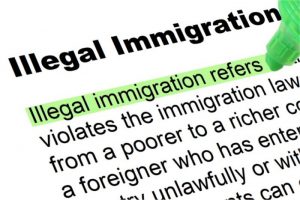If there’s one topic which has dominated the press more than any other in the last decade it’s immigration. On one hand we’re told that the country is being overwhelmed by illegal immigrants. Immigration – legal or otherwise – was the major deciding factor in the Brexit vote. It’s certainly something which many people worry about. But is illegal working in the UK really a problem? Finding facts and figures isn’t easy, but let’s look at the overall picture.
Penalties for Illegal Working in the UK
 One thing which is very clear is the rules around illegal working. The UK government makes the laws about who is and who is not allowed to work here. In simple terms, people from the EU are allowed to live and work in the UK without restrictions, People from the rest of the world need a work permit or visa. This might all change after Brexit. Employers have to make sure that they are employing people legally. If they are found to be employing people who have no right to work in the UK, fines can be as much as £20,000 per worker. In the first quarter of 2018, 637 illegal workers were found nationwide, resulting in total fines of over £7.6 million. Most illegal workers are detected in London and the South East.
One thing which is very clear is the rules around illegal working. The UK government makes the laws about who is and who is not allowed to work here. In simple terms, people from the EU are allowed to live and work in the UK without restrictions, People from the rest of the world need a work permit or visa. This might all change after Brexit. Employers have to make sure that they are employing people legally. If they are found to be employing people who have no right to work in the UK, fines can be as much as £20,000 per worker. In the first quarter of 2018, 637 illegal workers were found nationwide, resulting in total fines of over £7.6 million. Most illegal workers are detected in London and the South East.
What Should Employers Do?
Many employers are concerned about the level of fines for employing illegal workers and do their best to check people out. Usually, employers will ask to see everyone’s passport at interview stage. An EU passport requires little checking, other than that it actually belongs to the person in front of you. Other passports should have visas stamped into them if the holder is permitted to work in the UK. The Home Office is happy to give guidance if there is any confusion. Employers aren’t expected to be experts on immigration law. They just have to prove that they have done everything they can to verify identities and check on right to work.
Police Checks on Foreign Nationals
Many occupations require a further level of checking into the criminal background of workers. This process used to be done by the Criminal Records Bureau (CRB) and is now done by the Disclosure and Barring Service (DBS). There are lots of issues around this sort of checking and people who have only recently arrived in the UK. DBS checks can only look into UK police records, not overseas records. People who are coming from overseas to work as nurses or teachers might be asked to get their own checks run in their home country before arriving. In other cases, employers will have to use their own safe recruitment policy to decide what to do.
Part of the DBS process is checking the identity documents of the applicants. This stage could also help an employer identify someone who doesn’t have the appropriate right to work in the UK. It’s important to remember that there are many people who have a right to live in the UK but not a right to work. Don’t assume that a person who can’t work legally in the UK is by default an illegal immigrant.